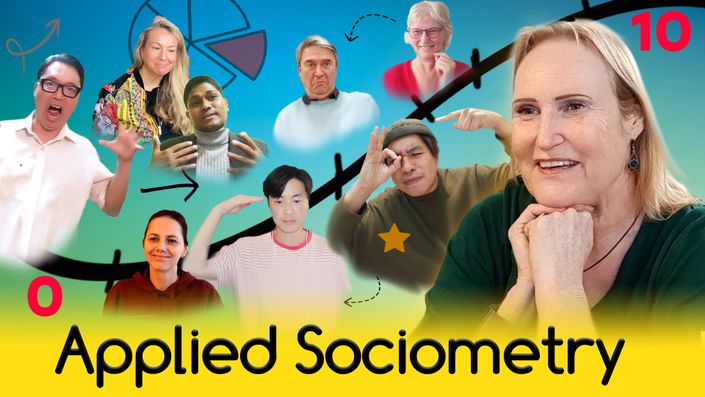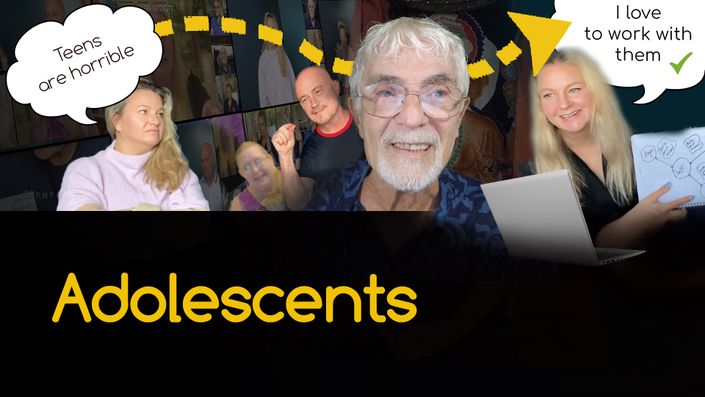$60 (One Module) - 100 days access
Countries of resedence are grouped into pricing Bands A–D, offering 30–70% discounts, applied to all modules and courses. Find your band here.
About the Course:
Sociometry is a quantitative method for measuring social relationships. Developed by Jacob L. Moreno, it involves analyzing the patterns and structures of social interactions within a group. Sociometry aims to uncover the underlying social connections, such as friendships, alliances, and conflicts, by mapping out the preferences and choices individuals make regarding their relationships with others. This approach is often used in psychology, sociology, and organizational studies to improve group dynamics, enhance communication, and resolve conflicts.
In sociometry, a role is the behavior pattern or function an individual assumes within a group. Roles are shaped by personal attributes, interpersonal dynamics, and the group's expectations. Understanding roles helps identify how individuals interact and contribute to the group's overall structure. Role development refers to how individuals' roles evolve over time. This evolution can be influenced by changing group dynamics, personal growth, and situational factors. Effective role development enhances group cohesion, improves communication, and supports individual well-being.
Join an exciting transformative journey with 9 professionals—therapists, counselors, and coaches—from the US, Netherlands, Spain, Nepal, Latvia, Hong Kong, and Malaysia. Guided by instructor Jacomien Ilbrink-de Visser, CP, PAT (TEP in training).
This module is designed for:
• Therapists
• Social workers
• Counselors
• Educators
• Coaches
• Community leaders
• Researchers
• Criminal justice officers
Appropriate for those who are new to action methods, as well as experienced practitioners, students in mental health fields, and those who want to develop their skills in action methods.
Learning Objectives:
• Demonstrate how to identify the Roles by gaining the ability to recognize and categorize various roles individuals play within a group setting. Describe how these roles impact group dynamics and individual interactions.
• Explore Role Development Processes. Examine the factors influencing role evolution over time, including personal growth, group changes, and situational contexts, and facilitate role development to enhance group cohesion and effectiveness.
• Demonstrate how to apply Sociometric Techniques to assess and analyze roles within a group, and how to implement strategies for improving group dynamics and supporting individual well-being through effective role development.
Module highlights:
• Key Sociometric concepts: Sociometric Star, Sociometric Isolate.
• Facilitation Skills: how to facilitate a group using Sociometric instruments: Dyads, Locograms, Spectrograms, Step in circle, Sociogram
How and where to use:
In Education, for:
• Classroom Dynamics
• Bullying Prevention
• Conflict management
• Building relationship
In Organizational Development, for:
• Team Building
• Change Management
• Conflict resolution
In Therapy and Counseling, for:
• Group Therapy
• Couples and Family Therapy
• Substance Use Counseling
In Community Development, for:
• Community Building
• Conflict Resolution
In Health and Social Services, for:
• Patient Care
• Social Work
In Research, for:
• Social Science Research
In Criminal Justice, for:
• Rehabilitation Programs
• Gang Dynamics
Presenter:
Jacomien Ilbrink-de Visser from the Netherlands, CP, PAT (TEP in training). Jacomien received her training in psychodrama in New York City, where she mastered the application of explicit sociometry, also known as hand-on-shoulders sociometry. Over the past decade, she has specialized in teaching sociometry to clinicians, coaches, and educators in Europe, developing a structured approach to its safe application using Moreno’s developmental theory as a guideline.
Module Includes:
Main Content:
• Videos - 107 min
• Handouts - 15 min
• Test - 30 min
• Course Survey - 5 min
Recommended Content:
• Practicum - 60 min
Hours for Certificate:
• 3.5 training hours on the Action Explorations Education Certificate. Our courses may be applied toward professional certification/training hours, depending on your board’s policies. Please verify eligibility with your certifying board or primary trainer. We’re happy to connect and answer questions about course content, hours, and documentation. Reach out anytime with your questions.
Module Curriculum
*Recommended Videos Not Included in Total Hours for Certificate
- Video 1. Self-Care Sociogram (16:09 min)
- Video 2. Recharge Time Spectrogram. Self-Care Sociogram. (13:27 min)
- Video 3. Self-Care Role Model. Action Sociogram. (11:36 min)
- Video 4. Breakout Rooms with Role Models. (19:02 min)
- Video 5. Teaching Points. (14:20 min)
- Video 6. Action Sociogram Teaching Points. (14:49 min)
- Video 7. Choosing a Protagonist. (8:40 min)
- Video 8. Summary and Sharing. (8:41 min)



